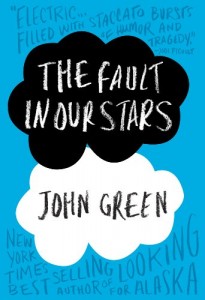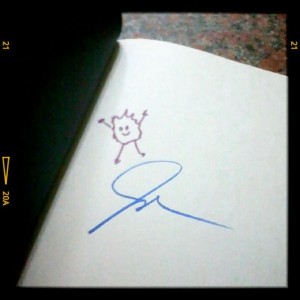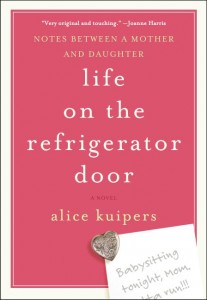 The Fault In Our Stars by John Green
The Fault In Our Stars by John Green
Publisher: Dutton
Number of pages: 313
My copy: signed hardbound, ordered from Book Depository
Diagnosed with Stage IV thyroid cancer at 12, Hazel was prepared to die until, at 14, a medical miracle shrunk the tumours in her lungs… for now.
Two years post-miracle, sixteen-year-old Hazel is post-everything else, too; post-high school, post-friends and post-normalcy. And even though she could live for a long time (whatever that means), Hazel lives tethered to an oxygen tank, the tumours tenuously kept at bay with a constant chemical assault.
Enter Augustus Waters. A match made at cancer kid support group, Augustus is gorgeous, in remission, and shockingly to her, interested in Hazel. Being with Augustus is both an unexpected destination and a long-needed journey, pushing Hazel to re-examine how sickness and health, life and death, will define her and the legacy that everyone leaves behind.
* * *
The YA reading world was buzzing with excitement last year when John Green announced that he would have a new book out, and I was one of them. I was one of the people who was terribly excited when he said he would sign all pre-orders and I pre-ordered mine by December, which kind of made me wait a bit when our local bookstores surprisingly got copies on the day The Fault In Our Stars was released. I had to avoid reading reviews of the book because I was so antsy to read it but I had to wait an entire month to get it. I forgot about that because this greeted me as soon as I opened the book when it finally arrived:

I got a yeti! :)
Yay a yeti!
The Fault In Our Stars introduces Green’s first female protagonist, Hazel Grace Lancaster, who was diagnosed with a Stage IV thyroid cancer at the age of 12. By a medical miracle, she is now 16, but remains terminal and knows that one day cancer will come back to claim her. During a cancer support group meeting, she meets charismatic Augustus Waters, a cancer survivor who seems to be interested in her. Wary but also mildly curious, she starts spending time with Augustus, inadvertently changing her life as she knows it.
Reading The Fault In Our Stars reminds me of this time a few years ago when some high school friends and I attended a wake of a classmate’s sister. The sister’s — let’s call her Mary — death was a shock to all of us. Our high school was small so we pretty much know each other, especially the ones who belong to a certain group of kids, like the achievers. Mary was one of those, and not only was she a smart kid but also a jock, and pretty much an all around nice girl too. She took up Psychology in college and just graduated before cancer took her away from everyone at the age of 20.
We weren’t close, but I was good friends with Mary’s brother, who was in my batch. We went to the wake, and I remember being nervous at looking at her casket because…well, I was scared to look at someone so young yet dead. I remember bursting into tears when I finally looked at her, and to be perfectly honest, it wasn’t only because I was sad she was gone but because it reminded me of something that I was afraid to think of.
To quote my blog entry from that time:
It was like I was staring at my own mortality. Back then, I only hear of cancer from people who are aging, from people on TV. It wasn’t a possibility for me or any of my friends before — we’re too young and the world’s so big and there’s so many things to do for us to suffer from a disease like that. But seeing someone even younger than me pass away, not even getting to experience how it is to be outside of school…to imagine someone like her going through chemotherapy treatments…it doesn’t feel right. It’s so unfair.
You know what they’d say about this: but life is never fair. And anyway, everyone will die at some point, it’s just that someone left earlier. But that doesn’t really make it feel any better, or make losing people to death (and cancer) less painful, right?
Here’s a fact: after reading The Fault In Our Stars, I am still pretty much convinced that John Green can do no wrong with writing contemporary YA. His latest novel has all the wit and charm and realness that only he can write. This book is just as charming as An Abundance of Katherines with all the funny dialogue, as well as having the memorable characters and scenes as Paper Towns (Isaac is one of my new favorite sidekicks). The Fault In Our Stars has the comic relief and the seriousness of Looking for Alaska, but definitely less of the unattainable girl because Augustus made himself attainable right from the start. ;) The only thing this book has that the other Green books don’t have is the cancer, and John Green tackles that subject with enough sensitivity and seriousness that it makes us who are blessed not to experience that (whether with ourselves or with someone else we care for) somewhat understand a fraction of it. The book is very readable and realistic, despite some of the scenes that felt a little too outrageous and yes, a little too romantic and almost cheesy for my taste. Oh, but don’t get me wrong — this romance is probably the best of all in all of Green’s novels. Chasing an unattainable person and deciphering their mysteries can be a bit tiring, don’t you think?
Cancer plays a big part in this book, but if I you ask me, I didn’t see this as a cancer book. Cliche and cheesy as this may sound, I saw this book as a book for the living, to remind us of some things that people with terminal cases know: that we are all dying. I think if this was a normal contemporary YA story without the sick characters, I would’ve felt annoyed at Augustus’ presumptuous comments to Hazel, and I would tell Hazel to stay far far away from this boy who thinks he’s got her all figured out. But I believe Augustus was acting that way because he knew that life is short, and if you don’t say what you feel, or at least, if you’re not perfectly honest with the people you care about, then one day it might be too late for you to say the things you wanted to say in the first place. It goes both ways too — learning to receive the care and love and attention that other people offer out of their affection. Sometimes that’s even more difficult than giving it, because we think we don’t deserve it. There’s just as much grace in receiving kindness and love as in giving it. If anything, Hazel and Augustus’ love story is about choosing to live our lives despite the fact that we are all dying.
And because comparisons are unavoidable — here’s the order of all John Green books I have read based on how much I like them:
- Paper Towns
- The Fault In Our Stars
- An Abundance of Katherines
- Looking for Alaska
Paper Towns has the best plot out of all IMHO, but I think The Fault In Our Stars shine just as well as my favorite. So it might have taken me some time to get this book in my hands from its announcement to its release, and some more time to read it but the wait for this book was definitely worth it. :)
Rating: [rating=4]
Other reviews:
Chachic’s Book Nook
Book Harbinger
In Lesbians with Books
RonReads
The Book Smugglers

 Life on the Refrigerator Door by Alice Kuipers
Life on the Refrigerator Door by Alice Kuipers